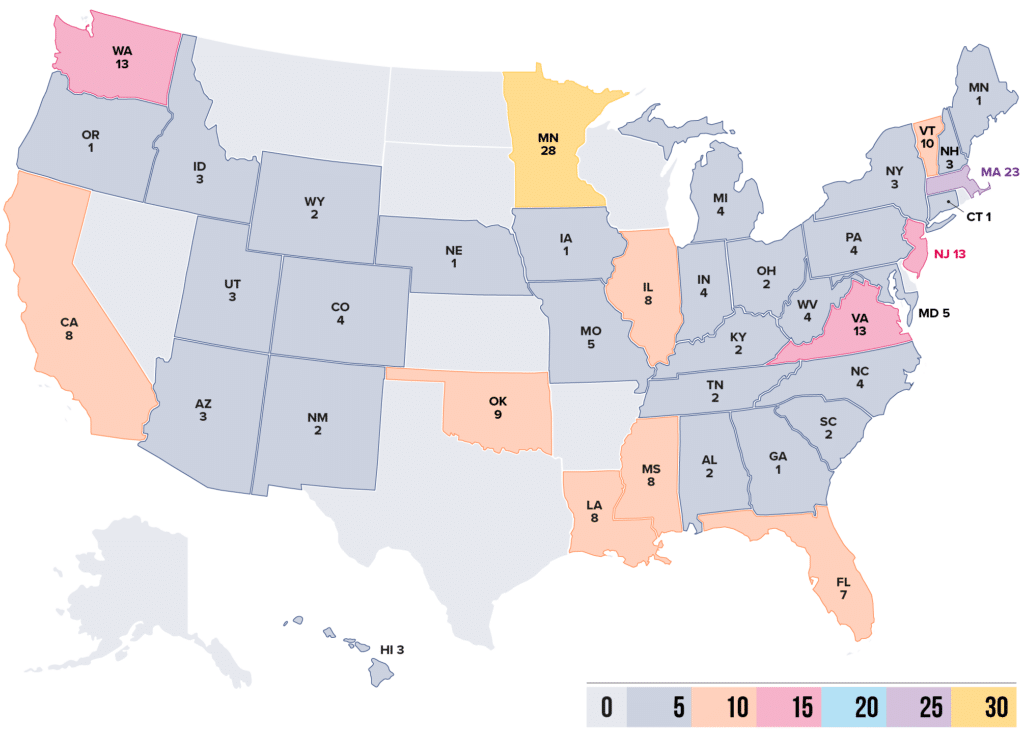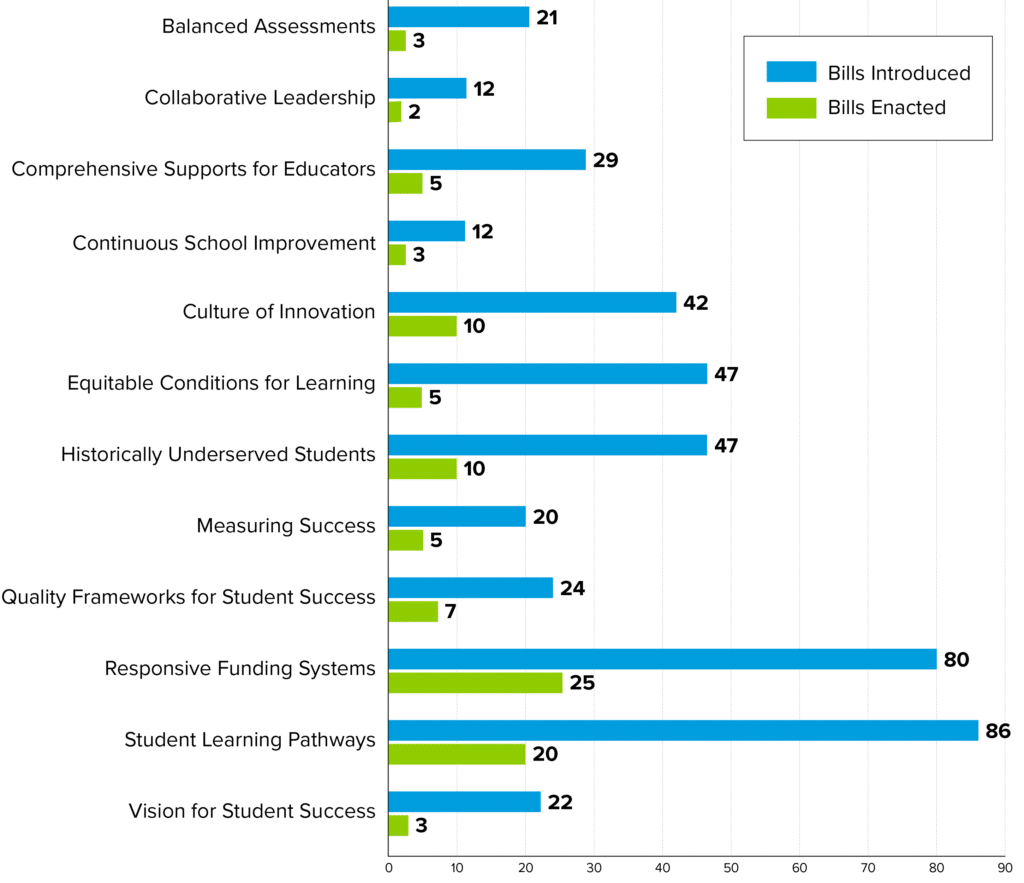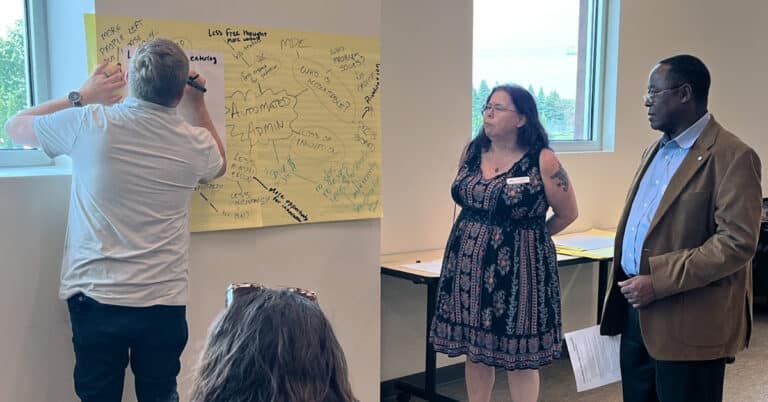By Senior Manager of Policy, Advocacy and Research Emily Brixey, PhD, and KnowledgeWorks Policy and Advocacy Research Intern Sydni Burg
This information is accurate as of mid-July 2024.
With rapid advances in artificial intelligence, a looming fiscal cliff and a constantly changing workforce, states must continue to evaluate their education systems and consider how best to prepare students for postsecondary education and the workforce.
2024 marks the third year of KnowledgeWorks’ legislative tracking initiative. This year, we’ve seen states prioritize policies to encourage more personalized approaches to education, expanding student learning pathways to prepare students for their postsecondary goals and aspirations and creating more flexibility through policies that engender a culture of innovation. As the timeline to spend federal education stimulus dollars comes to a close, states have to think creatively and intentionally about how to fund current and future programs, with greater attention to equitable distribution of these dollars.
At KnowledgeWorks, we leverage our State Policy Framework for Personalized Learning to ground our policy work across states. It includes 12 policy conditions necessary for the successful implementation of student-centered learning.
- Vision for student success: Policies clearly articulate a vision for education that includes personalized learning to ensure every student graduates with the academic knowledge, skills and social-emotional competencies to succeed
- Collaborative leadership: Policies support the engagement of a diverse group of stakeholders across all levels of the education system to create structures for personalized learning
- Comprehensive supports for educators and leaders: Policies provide systemic efforts to build professional capacity for the implementation of high-quality personalized learning
- Supports for historically underserved students: Policies establish equitable practices aligned to culturally responsive and trauma-informed practices to intentionally address gaps in student outcomes
- Equitable conditions for learning: Policies include services provided in schools or by schools that support whole child development
- Student learning pathways: Policies empower all students to access and complete equally rigorous pathways that enable the exploration of career interests
- Quality frameworks for student success: Policies support a learning framework, or set of standards, that represent the full-range of knowledge, skills and social-emotional competencies students need to success
- Balanced assessment: Policies develop or implement formative, benchmark, interim and summative assessments at the state and district level that empower educators and deepen student learning
- Measuring success: Policies support a robust performance measurement system, including accountability and reporting tools
- Culture of innovation: Policies empower educators, researchers, communities and families to design, refine, evaluate and advance new learning models that better support student needs.
- Responsive funding systems: Policies support adequate, equitable and flexible funding and resource systems that enable educators to advance personalized learning and address educational inequities
- Continuous school improvement: Policies support the improvement of all schools with transparent, dynamic systems that empower local leaders and their communities to diagnose, analyze and address the needs of all students.
According to the National Conference of State Legislatures’ 2024 State Legislative Calendar, 46 states and the District of Columbia held a legislative session. So far this year, KnowledgeWorks has tracked at least 219 bills across 39 states and the District of Columbia that support one or more policy conditions from our framework for personalized, competency-based education. Fifty-four of those bills have been enacted across 27 states. While the overall number of bills is lower than in previous years, we’ve seen more states pass legislation that supports personalized and competency-based learning (up from 16 states last year). This shows an increased investment in policy landscapes nationwide that support personalized and competency-based education.

Personalized learning policy trends
Here we highlight trends from the policy areas in our State Policy Framework for Personalized Learning that had the most legislative action this year.

While we cast a wide net with our policy tracker, we acknowledge that we cannot catch every bill related to personalized, competency-based learning. To interpret these numbers, consider them to be the minimum number of bills introduced and enacted for each policy condition. Additionally, bills can and do address multiple policy conditions – for example, if a single bill addresses both student learning pathways and responsive funding systems, it will count in both rows.
Below, we outline the five trending policy conditions from the 2024 legislative session. Each section includes examples of enacted bills related to each trending policy condition with an explanation of how the policy will help the state move towards a system of education that supports personalized and competency-based learning.
Responsive funding systems
High-quality, public K-12 education depends on responsive funding systems, including grant programs, categorical funds and school funding formulas that support the student learning experience. In this session, states introduced at least 80 bills that advance personalized, competency-based education practices through responsive funding for career technical education (CTE) pathways, pilot programs, expanded course options, updated technology, professional development for educators and more. Twenty-five of these bills passed across 16 states.
Colorado H.B. 24-1364 authorizes the Colorado Department of Education to commission a financial study with an independent contractor to analyze the costs to the state and school districts, district charter schools, institute charter schools and boards of local education providers and the potential cost savings to provide students with the opportunity to obtain college credits, industry credentials and work-based learning experiences. Investing in this type of analysis may ultimately lead to greater spending efficiencies and enable education dollars to be used for other needs. The bill allocates $5 million to the Office of Information Technology to create the Colorado statewide longitudinal data system. In that system, this information will help inform effective state investments, policy research and also assist learners in making choices related to their education and training pathways. This financial study and the creation of an ongoing data system will help the state maximize the dynamic learning opportunities that occur outside the classroom in partnership with industries and community partners.
Florida H.B. 1361 appropriates $2 million in recurring funds to create the Lastinger Center for Learning at the University of Florida, which is intended to provide professional learning for educators to improve the quality of instruction in early learning, literacy and mathematics. This bill also offers grant funds for subscription fees and professional development around artificial intelligence and how it can be leveraged to customize and accelerate student learning. Lastly, the appropriations in this bill support the administration of the New Worlds Tutoring Program, which provides students who have a substantial deficiency in reading or mathematics with additional academic support during the school day, as well as real-time interventions that are individually tailored to the needs and ability of each student. How this bill is implemented will drive outcomes, as the most effective tutoring practices are personalized to the individual and leverage instructional practices that promote deeper learning and mastery of higher-order thinking skills rather than just filling information gaps. By targeting various levels of student support systems, including direct tutoring and educator professional learning, states can help enhance their learning environments and more effectively improve student outcomes.
Student learning pathways
Learning is made personal and applicable through pathways that allow students to cultivate their unique interests, strengths and passions both inside and outside of the classroom. In this session, at least 86 bills were introduced that expand student learning pathways toward high school graduation and postsecondary success. Between CTE programs, work-based learning opportunities, apprenticeships and dual-enrollment courses, at least 20 bills enacted across 11 states catalyze a wide range of student learning pathways that could enhance the quality and quantity of high school diplomas earned.
Oklahoma H.B. 3278 modifies graduation requirements to include six pathway units or sets of competencies across disciplines that help students develop transferable life skills and a more personal academic experience. This bill requires school districts’ boards of education to establish pathway units with expanded course options that may include any additional units or sets of competencies approved by the school district board of education, world or non-English language, computer technology, Junior Reserve Officers’ Training Corps, internship or apprenticeship programs, career and technology education courses, concurrently enrolled courses, advanced placement courses, International Baccalaureate courses approved for college admission requirements or other approved courses that align with a student’s Individual Career and Academic Plan (ICAP). As such, this bill encourages students to explore their personal interests and take ownership of their learning more meaningfully.
Virginia S.B. 199 requires the Board of Education, in collaboration with the Virginia Community College System, career and technical education directors and industry partners, to develop and maintain a current, comprehensive and uniform list of industry-recognized workforce credentials that students may take as substitute for certain units of credit required for graduation, including such credentials that are accepted as substitutes for electives credits and credentials completed outside of regular school hours. This bill creates policy guidance that will enable learners to better tailor their education to their needs and interests. Students will be able to leverage this database as a tool to both learn more about the credentials available to them and make choices that support their graduation requirement needs along with their career goals.
Culture of innovation
Personalized, competency-based education thrives when a culture of innovation allows education leaders, teachers and students to try new ways of learning. During this legislative session, several states implemented new pilot programs and curriculum and instructional time model flexibilities that challenge the traditional system and expand the one-size-fits-all learning mold. Across nine states, at least 10 bills were enacted out of the 42 introduced this session that promote a culture of innovation.
Minnesota H.F. 5237 is an education omnibus bill that, among other things, creates a pilot program meant to strengthen the pipeline of qualified educators in Minnesota. The program pays stipends to support student teachers in completing the clinical experiences necessary to obtain Minnesota teaching licenses. Policymakers will use survey and interview data from program participants to better determine how to reduce the financial burden of completing valuable clinical experiences and to inform policy recommendations for implementing a statewide paid student-teacher program. This pilot program will allow the state to test the effectiveness of stipend incentives and ideally move closer to creating a student teaching system that produces a higher volume and quality of Minnesota teachers who are amply equipped to guide the student learning experience.
South Carolina H. 3295 permits the State Board of Education to exempt schools from state law, policies and regulations that hinder the implementation of competency-based practices and permits districts to submit a waiver application for similar exemptions. A definition for competency-based education practices that aligns with the Profile of the South Carolina Graduate underscores the state’s ongoing effort to develop an instructional system emphasizing mastery of knowledge and skills. The bill also adds definitions for an “instructional day” and “hours of instruction” that incorporate off-campus educational opportunities and experiential learning, enabling competency-based education activities to count toward instructional time requirements. This bill institutionalizes the practices of competency-based education in South Carolina and permits broader use of exemptions to allow for competency-based approaches to education. The enactment of this bill comes after many years of advocacy by its supporters. In 2022, following several sessions of similar bills falling short of adoption, the legislature included a note in the budget proviso allowing full districts to seek a competency-based education waiver temporarily. The formal adoption of H. 3295 in this session cemented the 2022 temporary allowance to ensure the broad use of personalized and competency-based practices in South Carolina Schools.
Equitable conditions and supports for historically underserved students
The achievement of equitable outcomes requires the intentional removal of barriers that limit student access to educational opportunities. Oftentimes, whole child services like free schoolwide lunches that provide baseline supports for all students can ensure that all students have access to essentials that prepare them to learn. States may target these support services to student populations with the greatest need or prioritize programs and policies based on the greatest needs of their students. During this legislative session, at least 47 bills were introduced that provide supports for historically underserved students, 10 of which passed. At least 47 bills were introduced that provide more equitable conditions for learning, five of which passed.
Utah H.B. 247 directs the state board to coordinate with the Utah System of Higher Education to study funding structures and access barriers related to concurrent enrollment for the Statewide Online Education Program and provide recommendations to the Education Interim Committee no later than the November 2024 meeting. By studying the barriers to student participation, Utah will be able to use the information to more effectively remove barriers and increase education opportunities for students, improving equity. The bill also instructs the state board to provide counseling opportunities for students participating in the Statewide Online Education Program, subject to appropriations. The bill specifically states that students should be counseled on how course options relate to graduation requirements.
New Jersey S.B. 1478/A.B. 2331 are companion bills that create the YouthBuild program in the state to support economically disadvantaged youth “to obtain the education, job skills training, personal counseling, leadership development skills training, job placement assistance and long-term follow-up leading to economic self-sufficiency.” The program will provide services that include an activity split with 50% of participants’ time spent on classroom-based instruction, counseling and leadership and 50% of participants’ time spent on service-learning experiences at construction sites to support vocational learning experiences. The program includes stipends for participants to help cover the costs associated with full-time participation. The bill appropriates funding to the Commissioner of the Department of Labor and Workforce Development to administer the program through a competitive grant process. This bill demonstrates a movement towards a partnership between community organizations and the Department of Education and Workforce to prepare students, specifically those who experience greater challenges, for postsecondary life and career success.
Quality framework for student success
Learning frameworks or sets of standards that encompass the full range of knowledge, skills and social-emotional competencies necessary for student success are a foundational aspect of competency-based education. Frameworks provide transparent learning expectations and standards for mastery that help students cultivate transferrable skills and develop life-long learning mentalities. In this session, states passed at least seven bills and introduced at least 24 bills that advance quality frameworks for student success.
Indiana H.B. 1243 is an education omnibus bill that, among other things, directs the state board of education to establish Indiana diploma designations that indicate a student is adequately prepared for direct entry into either the workforce or postsecondary education upon graduation. Diploma designations must explore competency-based methods to demonstrate proficiency in a course or skill area required for graduation and include a requirement that the student successfully completes a work-based learning experience aligned with their postsecondary goals. This bill paves the way to a broader, more versatile and comprehensive framework for student success that emphasizes measures of quality, depth and proficiency over instructional hours or credits.
Policy experts from KnowledgeWorks and Education Commission of the States highlight notable pieces of legislation and general trends.

Sydni Burg
Former KnowledgeWorks Policy Research Intern
Sydni helped propel the KnowledgeWorks policy tracking system into its third year of operation and tracked over 500 bills this legislative session. She graduated from University of Michigan’s Gerald R. Ford School of Public Policy where she studied structural inequity in American institutions, economics and law and cultivated a passion for education policy. Sydni brought valuable experience from previous roles with the NYC Council, the NYC Council Committee on Higher Education and the Democratic Congressional Campaign Committee.







